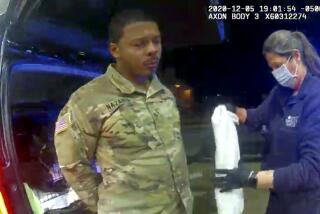Fierce Battles Mar Macedonia Truce
After a day of fierce battles between ethnic Albanian guerrillas and Macedonian security forces in this country’s second-largest city, the defense minister warned rebels on Monday to withdraw from territory occupied during an 18-day truce or face an all-out assault.
“If the terrorists do not withdraw to their positions of July 5, we will have no option left but an offensive by Macedonian security forces to restore the previous situation,” Defense Minister Vlado Buckovski told reporters.
An 11-year-old girl was killed, at least 27 civilians were hospitalized and five soldiers were wounded in fighting in and around the northwestern city of Tetovo, authorities said.
In a separate incident farther south, a Macedonian soldier patrolling the mountains bordering Albania was killed by guerrillas who had crossed from Albania, the Defense Ministry said.
Rebels kidnapped 22 Macedonian civilians in villages around Tetovo, army spokesman Blagoja Markovski said. State-run television also reported that guerrillas had burned the houses of eight Macedonian Slav families in a village near Tetovo.
The fighting in Tetovo was focused around a soccer stadium at the edge of the city. The stadium had marked the front line between rebel and government forces since a cease-fire took effect July 6. There were also exchanges of mortar fire between the two sides, with the rebels hitting the city center and an army base in Tetovo, and the army shelling villages and guerrilla positions in the mountains above Tetovo.
Sniper shots could be heard in the center of the primarily ethnic Albanian city. Mayor Murtezan Ismaili said one bullet narrowly missed his secretary, who was not injured. Some civilians took shelter in basements. At least 100 carloads of residents fled the city headed toward Skopje, the capital.
The army used infantry, artillery and tank units in the Tetovo fighting, Markovski said.
By nightfall, an eerie silence had descended over the center of the city, although the sounds of fighting could be heard in the distance. A curfew was to be in effect from 11 p.m.
Each Side Blames the Other for Violation
Each side blamed the other for provoking the largest violation yet of the cease-fire, which had been declared under strong Western pressure in an effort to improve the atmosphere for negotiations over political reforms.
The guerrillas say they are fighting for greater rights for ethnic Albanians, while the government charges that they want to split the country. At least one-quarter of the nation’s 2 million people are ethnic Albanian, most of whom live in the western region close to Albania or Kosovo, a province of Yugoslavia’s dominant republic, Serbia.
The talks, which do not directly include the guerrillas, are deadlocked primarily over whether Albanian should be made an official language. Ethnic Albanian politicians are believed to be in touch with the rebels over what terms would be acceptable to them.
If agreement is reached in the political talks, the rebels would be asked to agree to a peace deal that the North Atlantic Treaty Organization would help implement.
“The guarantor of the cease-fire was the international community,” Buckovski said. “We expect NATO to use its authority. The terrorists should immediately end their attacks and go back to the positions of before July 5. If they don’t, it’s known what will follow.”
Buckovski added, “There are two alternatives: One is to find the strength to continue with the cease-fire and the dialogue, and the other is to take your hands off everything that leads to a peaceful solution and go for a military one.”
Buckovski, who charged that the guerrillas have violated the cease-fire 267 times since July 6, met Monday evening with NATO representatives and with U.S. special envoy James Pardew.
Pardew and European Union envoy Francois Leotard issued a statement condemning the violence, without placing greater blame on either side.
“Violence is unacceptable and does nothing to further the cause of the people of this region,” they said. “It could only undermine the peace process while the political talks are still ongoing.”
In Washington, State Department spokesman Philip T. Reeker said that “the cease-fire is absolutely vital.”
“Any breach of the cease-fire we consider unacceptable,” Reeker said. “All sides, including the armed ethnic Albanian separatists who have taken to arms and fighting, as well as the government of Macedonia, must exercise restraint and respect the cease-fire agreement that they signed.”
Support for Guerrillas Is Extremely Strong
While ethnic Albanians and Macedonian Slavs generally continue to live peacefully in Skopje, fears are growing here that the current political reform talks are the last chance to avoid all-out war. Support for the guerrillas among ordinary ethnic Albanians is extremely strong.
“The situation here is like playing the lottery--nobody can guess what really will happen,” said Sulejman Rushiti, a 29-year-old ethnic Albanian theater director in Skopje. “We have reached the high point of trying to find a compromise. If the negotiations fail, then everybody [among ethnic Albanians] will take a decision. I as a person will have two choices: leave Macedonia, or go to the mountains and try to fight.”
More to Read
Start your day right
Sign up for Essential California for news, features and recommendations from the L.A. Times and beyond in your inbox six days a week.
You may occasionally receive promotional content from the Los Angeles Times.






